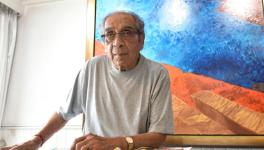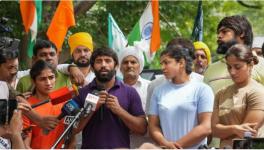Depiction of Woman’s Naked Body not Obscene: Kerala HC Questions Hypocrisy
Representational use only.
The Kerala High Court (HC) dismissed a Protection of Children from Sexual Offences (POCSO) Act, 2012, case against Kerala activist Rehana Fathima on Monday regarding her controversial Facebook video showing her children painting on her semi-nude body.
Quashing the case, Justice Kauser Edappagath observed: “The mere sight of the naked upper body of the woman should not be deemed to be sexual by default. The depiction of the naked body of a woman cannot per se be termed to be obscene, indecent, or sexually explicit.”
Fathima was charged under Sections 13, 14, and 15 of the POCSO Act, Section 67B (d) of the Information Technology Act, 2000, and Section 75 of the Juvenile Justice (Care and Protection of Children) Act, 2015, LiveLaw reported.
Noting that Fathima had explained that the video was created to challenge patriarchal notions and the sexualisation of women’s bodies, the court further observed: “Painting on the upper body of a mother by her own children as an art project cannot be characterised as a real or simulated sexual act nor can it be said that the same was done for the purpose of sexual gratification or with sexual intent.”
Justice Edappagath termed “this innocent artistic expression” as the “usage of a child in the real or simulated sexual act harsh”.
“There is nothing to show that the children were used for pornography. There is no hint of sexuality in the video. In the accompanying message, the petitioner has declared the purpose of the video as to make a political point against the default sexualisation of women’s bodies.”
Referring to the Supreme Court’s precedents in Ranjit D. Udeshi vs State Of Maharashtra and Aveek Sarkar & Anr vs State Of West Bengal And Anr, the HC stated that it is “wrong to classify nudity as essentially obscene or even indecent or immoral”.
“We have murals, statues and art of deities displayed in the semi-nude in ancient temples across the country. Such nude sculptures and paintings freely available in public spaces are considered art—even holy. Even though the idols of all goddesses are bare-chested, when one prays at the temple, the feeling is not of sexual explicitness but of divinity,” Justice Edappagath observed.
Invoking the principles of body autonomy, the HC also stressed society’s double standards on male and female bodies.
“The autonomy of the male body is seldom questioned while women’s body agency and autonomy are under constant threat in a patriarchal structure. Women are bullied, discriminated against, isolated, and prosecuted for making choices about their bodies and lives,” Justice Edappagath said.
The court said that body painting on men is an accepted tradition during Pulikali festivals in Thrissur, Kerala. On the freedom given to men, the HC said, “When Theyyam and other rituals are performed at the temple, painting is conducted on the bodies of male artists. The male body is displayed as six-pack abs, biceps, etc. We often find men walking around without wearing shirts.”
But these acts are “never considered obscene or indecent. While the half-nude body of a man is conceived as normal and not sexualised, a female body is not treated in the same way. Some people are so used to considering a woman’s naked body as an overly sexualised one or just an object of desire”, the court further observed.
The petitioner [Fathima] intended to expose society’s double standard that female nudity is “taboo because a naked female body is only meant for erotic purposes”, the court said.
Taking note of the video’s message and Fathima’s long history in battling patriarchy and hyper-sexualisation of women, the HC observed that the video should be viewed in this background.
Besides, her children also did not have a case of being sexually exploited or the petitioner permitted body art on her body for any sexual motive, the court said.
“Every parent tries their best to teach their children all about life. Every parent has the right to raise their children in the manner they wish. Children do not inherently grow up thinking that any action is right or wrong unless it is impressed upon them as such,” Justice Edappagath observed.
Finding that there was no wrong in Fathima allowing her body to be used as a canvas for her children, the court believed that the offence under Section 9(n) r/w 10 of the POCSO Act would not stand.
Regarding Section 13(b), which is made punishable under Section 14, the Court noted: “From the said allegation, it is not possible for anyone to infer or impute that the children were used for any real or simulated sexual acts—that too for sexual gratification. The petitioner only allowed her body to be used as a canvas for her children to paint on.”
A woman’s “right to make autonomous decisions about her body is at the very core of her fundamental right to equality and privacy. It also falls within the realm of personal liberty guaranteed by Article 21 of the Constitution”, the HC added.
Section 15 stipulates punishment for the storage of pornographic material involving a child. However, the court ascertained that “her children were not naked” in the video and only “participated in a harmless and creative activity and that there was nothing in the video that could be called pornographic”
Regarding offences under the IT Act, the act in question must be sexually explicit, obscene or indecent, the court said. “A video that was made to protest the default sexualisation of the female naked upper body must necessarily show that naked body to convey the intention in making and uploading the video. Such a depiction of nudity cannot make the material legally obscene or indecent.”
The court added that there is “absolutely no reason to believe that an ordinary man viewing the video would become depraved, debased and encouraged to lasciviousness. In the strict sense, the petitioner did not show her bare chest as the body paint covered her breasts. It can never arouse any sexually explicit feeling in the mind of a prudent man.”
The HC called for appreciating the video because of the “background in which it was made and in the light of the message it wanted to convey—that there should be nothing sexual or offensive about the naked female body. When viewed from that angle, it cannot be said that the video is obscene or indecent merely because it depicts the naked upper female body of the petitioner”.
There’s also no offence under Section 75 of the JJ Act since the children were neither assaulted nor abandoned, the court stated.
Besides, prosecution of the petitioner would have an adverse effect on the children and could not be allowed to be continued in their best interests, the HC concluded.
“In conclusion, I have no hesitation in holding that the final report does not support or even draw a prima facie case for any of the statutory offences as alleged. The court below completely overlooked the context in which the video was published and its message to the public. There is no sufficient ground for proceeding against the petitioner,” the Court held while setting aside the impugned order and discharging Fathima.
Get the latest reports & analysis with people's perspective on Protests, movements & deep analytical videos, discussions of the current affairs in your Telegram app. Subscribe to NewsClick's Telegram channel & get Real-Time updates on stories, as they get published on our website.
























